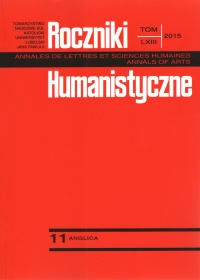America of future past: the post-apocalyptic chronotope of Jim Crace’s The Pesthouse
Abstract
Drawing on Mikhail Bakhtin’s assumptions concerning the literary chronotope, the article explores spatio-temporal relationships in The Pesthouse (2007), a novel by contemporary British writer Jim Crace (b. 1946). Katarzyna Pisarska contends that the dominant, post-apocalyptic chronotope of the novel arises from the interaction of two generic chronotopes, utopian and dystopian, which question the American myth of manifest destiny towards its ultimate reassertion. The topos of “a city on a hill”, which presupposes the conflation of America’s past (Eden) and future (New Jerusalem), is reworked as the eponymous pesthouse—the place of disease and recovery of not only the novel’s protagonist but also, implicitly, of the American dream. In the end, Pisarska argues, the novel expresses a revisionist nostalgia (sensu James Berger), as it produces the shock of the past invading the present in order to bring forth a utopian impulse.
References
Bakhtin, Mikhail Mikhailovich. “Forms of Time and of the Chronotope in the Novel: Notes toward a Historical Poetics”. The Dialogic Imagination: Four Essays. Trans. Caryl Emerson and Michael Holquist. Ed. Michael Holquist. Austin: University of Texas Press, 1985. 84–258.
Balée, Susan. “Jim Crace’s Violent Verities”. The Hudson Review 60.3 (2007): 517–27.
Bemong, Nele, and Pieter Borghart. 2010. “Bakhtin’s Theory of the Literary Chronotope: Reflections, Applications, Perspectives”. Bakhtin’s Theory of the Literary Chronotope: Reflections, Applications, Perspectives. Ed. Nele Bemong, Pieter Borghart, Michel De Dobbeleer, Kristoffel Demoen, Koen De Temmerman and Bart Keunen. 3–16.
Berger, James. “Cultural Trauma and the ‘Timeless Burst’: Pynchon’s Revision of Nostalgia in Vineland.” PMC 5.3 (1995): no pag. Muse. Web. 22 Oct. 2015.
Caldwell, Wilber W. American Narcissism: The Myth of National Superiority. New York: Algora Publishing, 2006.
Crace, Jim. The Pesthouse. London: Picador, 2007.
Edwards, Caroline. “Microtopias: The Post-Apocalyptic Communities of Jim Crace’s The Pesthouse.” Textual Practice 23.5 (2009): 763–786.
Ferns, Chris. Narrating Utopia: Ideology, Gender, Form in Utopian Literature. Liverpool: Liverpool University Press, 1999.
Kolbuszewska, Zofia. The Poetics of Chronotope in the Novels of Thomas Pynchon. Lublin: The Learned Society of the Catholic University of Lublin, 2000.
Moylan, Tom. Scraps of the Untainted Sky: Science Fiction, Utopia, Dystopia. Boulder, Colorado: Westview Press, 2000.
Sargent, Lyman Tower. “The Three Faces of Utopianism Revisited.” Utopian Studies 5.1 (1994): 1–37.
Slotkin, Richard. 1975. Regeneration Through Violence: The Mythology of the American Frontier, 1600–1860. Middletown, Connecticut: Wesleyan University Press.
Winthrop, John. 1979. “A Model of Christian Charity.” The Norton Anthology of American Literature. Shorter Sixth Edition. Ed. Nina Baym. New York, London: W. W. Norton & Company. 95–106.
Copyright (c) 2015 Roczniki Humanistyczne

This work is licensed under a Creative Commons Attribution-NonCommercial-NoDerivatives 4.0 International License.





